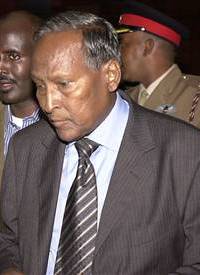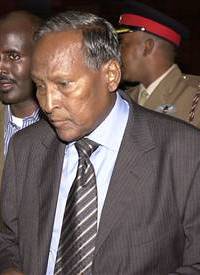Somali: A Pawn in Geopolitical Games?

 |
| President Yusuf: Resigned |
What is new about the current feral environment in and around
Little did folks realize then that in place of such comparatively petty corruption, we would be witnessing the misshapen, bewildering political situation that is prevailing in the country at the present time. Little also did people consider that the agent-instigators of the current perennial chaos would be fellow Somalis intent on fulfilling a far-reaching agenda of unvarnished greed of the highest order. Some of the chief operators among that unhappy lot utilize an externally directed radical ideology that is widely believed to be distortion of Islamic tenets. Still others seek to not only parrot alien, Western ideologies but also seem to have swallowed the ill-advised “solutions” contained therein, hook, line and sinker. They then blithely regurgitate their subsystems to mechanically help advance the crooked ends for which those misguided solutions were put forth in the first place. Talk about ‘grass trembling when elephants fight’!
There has been, over the past number of years of disorder, robbery on a grand scale and mass killings of mostly innocent non-combatants. But to have had that calamity followed by bungling, moral midget regimes with uncanny knacks for celebrating ineptitude to the point of allowing the continued destruction of the remaining vestiges of civilization in the country’s historical capital, along with many of its inhabitants, leaves one utterly dumbfounded. So the fundamental question remains.
Who exactly is fanning the flames of discord and division in
The proverbial ‘elephant in the room’ therefore is that seldom-discussed foreign factor, which has its many sharp fangs already sunk deep into
In times of uncertainty and confusion advantage goes to the organized. That is perhaps why
In the case of Somalia, the nation’s strategic location, the virtual homogeneity of its population and her vast natural resources – the very assets that would under normal circumstances provide the predicates for strong national unity – have been made to work against that very proposition. There are indications that, in deed, the prospect of keeping the unruly Somalis engaged in state mutual hostility (bordering on ‘mutually assured destruction’ type scenario) appeals to some external actors, who as of this writing may well be wringing their hands in the off chance of peace breaking out somewhere in that ancient land.
Occupying as she does an important piece of real state in the strategic Horn of Africa, Somalia is seen by few determined interlopers as a potential geopolitical prize—a territory ripe for fresh forays of exploitation. Hence the onrushing, thinly disguised foreign-led campaigns calculated to exacerbate matters in the hope of rendering the country’s political situation pretty much stalemated and inoperable. The resulting near state of paralysis already sets the country up for a new kind of neocolonial manipulation and political domination. The tools of such wicked trade were perfected long ago in the developed societies of the West. But lately otherworldly field-tested apparatus’ of instability are coming from a new quarter that is hitherto not known for undermining friendly nations. Such apparatus’ include the introduction of a virulent ideology that self-identifies with but is peculiar to the widely acknowledged Islamic ethos of bringing about peaceful co-existence and universal brotherhood.
If the manner in which the situation Somalia is currently devolving into the politics of grief is any indication, it is a matter of time before emerging powers such as
We already know from history that inter-clan and intra-clan animus in the Somali context has always had a limited shelf life. While simple quarrels sometimes degenerate into bursts of hostility, including physical engagements, differences are historically settled through the well developed traditional Somali mediation and conflict resolution system that is codified in the oral tradition of the extant Xeer Somaali. Further, the periodic contests and occasional fights in the countryside, though eye-catching, could not fully account for (nor begin to explain) the years of internecine wars and endless conflict that have gripped the country of late. And so a durable kind of conflict within Somali polity that defies logic and tests all human credulity continues unabated.
The considerable ink spilled and the great deal of analysis expended on the present state of politics in the country appears thus far to be all for naught. It all boils down to predictable scenarios much like the legend of the seven blind men and the elephant (with each identifying the part he touches as representing the whole beast). What we are left with, by way of explanation, is that of the imprudent role assumed by the revolting politicians. As regards rationale of their wretched behavior, there are as many as there are commentators. For when it comes to politics Somali-style in a generation, constructive ideas are hard to come by.
Consequently the current crop of politically active folks is quick to resorting to demonization of opponents. Some, especially the proponents of the Ibisi notion of takfeer (that inexplicably condemns Muslims with opposing views as “infidels”) seek even to physically eliminate their political adversaries. They view dialogue as sacrilege or worse betrayal of their fanatical agenda. It is with this kind of dismal ideology that sustains the fires that are scorching the Somali body politic. And it does not matter one whit to those aficionados inequity who or what ultimately gets burned in the brush fires that they surreptitiously set ablaze.
If, in the case of
Ali A. Fatah
Amakhiri@aol.com
Next week, Ali Fatah examines the known behavior of some of the more calculating actors, namely the Arabs, the Ethiopians, the Kenyans, the Eritreans, AU member states and the West, including the
